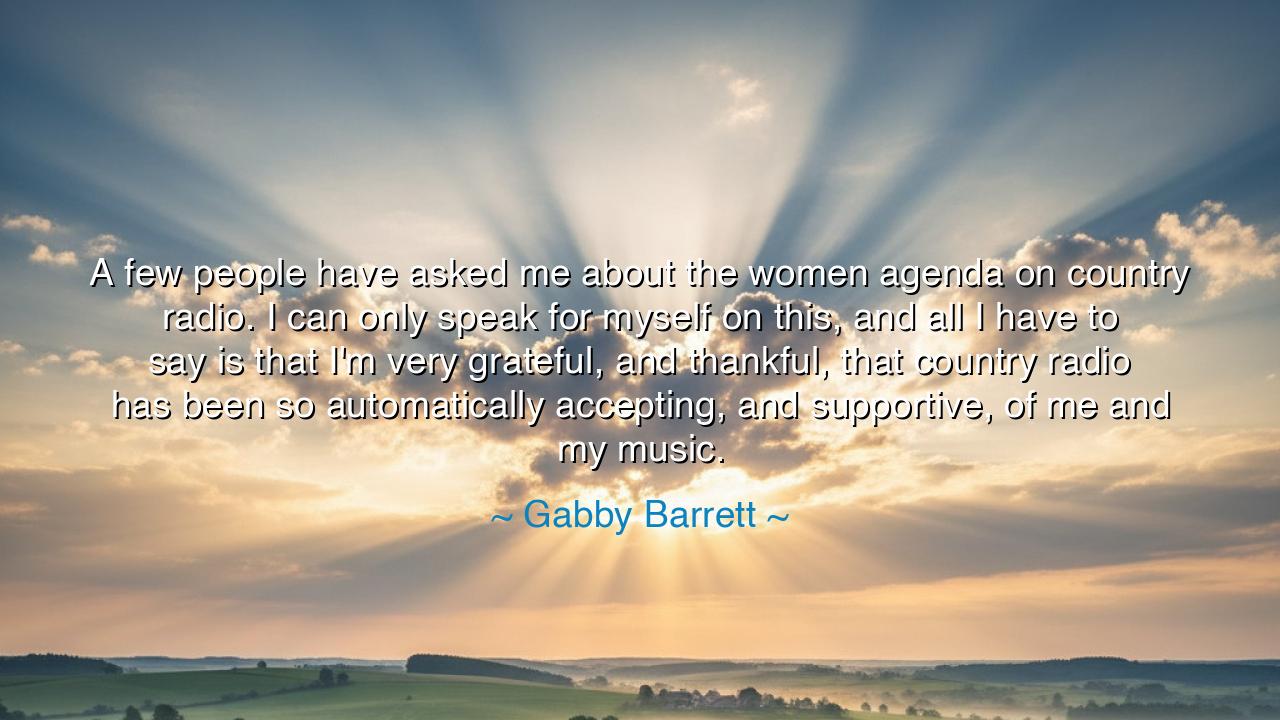
A few people have asked me about the women agenda on country
A few people have asked me about the women agenda on country radio. I can only speak for myself on this, and all I have to say is that I'm very grateful, and thankful, that country radio has been so automatically accepting, and supportive, of me and my music.






Hear the words of Gabby Barrett, spoken with humility, awareness, and reverence: “A few people have asked me about the women agenda on country radio. I can only speak for myself on this, and all I have to say is that I’m very grateful, and thankful, that country radio has been so automatically accepting, and supportive, of me and my music.” In this reflection lies a timeless truth, one that speaks not only to the world of song but to the struggles of women and pioneers throughout history. For she acknowledges the storm of debate that surrounds her, but chooses to answer with gratitude, recognizing the acceptance she has received and giving thanks for the chance to share her gift.
The ancients too knew of the struggles faced by those who sought to raise their voice in arenas not made for them. In Athens, women were rarely permitted on the stage; yet their stories—Medea, Antigone, Electra—were told through men, shadows of truths that longed to be spoken in their own voices. It was not until centuries later that women themselves could stand upon the stage and sing freely of their souls. Thus, Barrett’s gratitude for acceptance is not merely personal—it belongs to an ancient lineage of struggle, where countless voices yearned for freedom but were silenced.
Consider also the story of Clara Schumann, wife of the great composer Robert Schumann. Clara was a genius in her own right, yet in the nineteenth century, female musicians were rarely granted space upon the stage of Europe. Though she composed and performed brilliantly, she lived in the shadow of her husband, her work seldom celebrated as it deserved. Contrast this with Barrett’s time, where she can say with honesty that country radio has been supportive of her music. Her thankfulness is sharpened by the knowledge that such acceptance was not always granted, and that her path was paved by the struggles of others who came before her.
Her words also carry the weight of humility. She does not claim to speak for all women, nor does she deny the challenges that remain. Instead, she says, “I can only speak for myself.” In this humility there is strength, for she knows that every artist’s journey is unique, yet bound together by the broader struggle of recognition and equality. Her gratitude is not blindness, but clarity—a recognition of blessing in a world that has often been unkind.
To be thankful in such a context is not passive acceptance; it is an act of strength. Gratitude becomes a form of resistance against bitterness, a declaration that even in a flawed system, one can find light and build upon it. Barrett’s thankfulness does not diminish the struggle of others; rather, it acknowledges her own blessings while inspiring others to continue striving for greater inclusion and fairness.
The lesson here is clear: when you are welcomed into a place where others have struggled to enter, do not boast of your fortune but be grateful, and honor those who came before you by striving with humility and excellence. Acknowledge the acceptance you have received, but never forget that your blessings were made possible by sacrifices and battles beyond your own. In this way, gratitude becomes not only personal but communal, a thread that ties your story into the larger fabric of history.
Practical wisdom follows: when you are given a platform, use it not only for yourself but to lift others. Speak with thankfulness, for it softens hearts; act with integrity, for it strengthens trust. If you find acceptance, treasure it, but also work to extend that acceptance to others who may yet be waiting at the gates. Gratitude is the root, but responsibility is the fruit.
Thus, Gabby Barrett’s words resound as more than a singer’s reflection; they are a teaching for all who labor in fields once closed to them: “I am grateful, I am thankful, that I have been accepted and supported in my music.” Let this be the creed of every generation: to receive blessings with humility, to honor them with gratitude, and to turn them into pathways for others yet to come.






AAdministratorAdministrator
Welcome, honored guests. Please leave a comment, we will respond soon